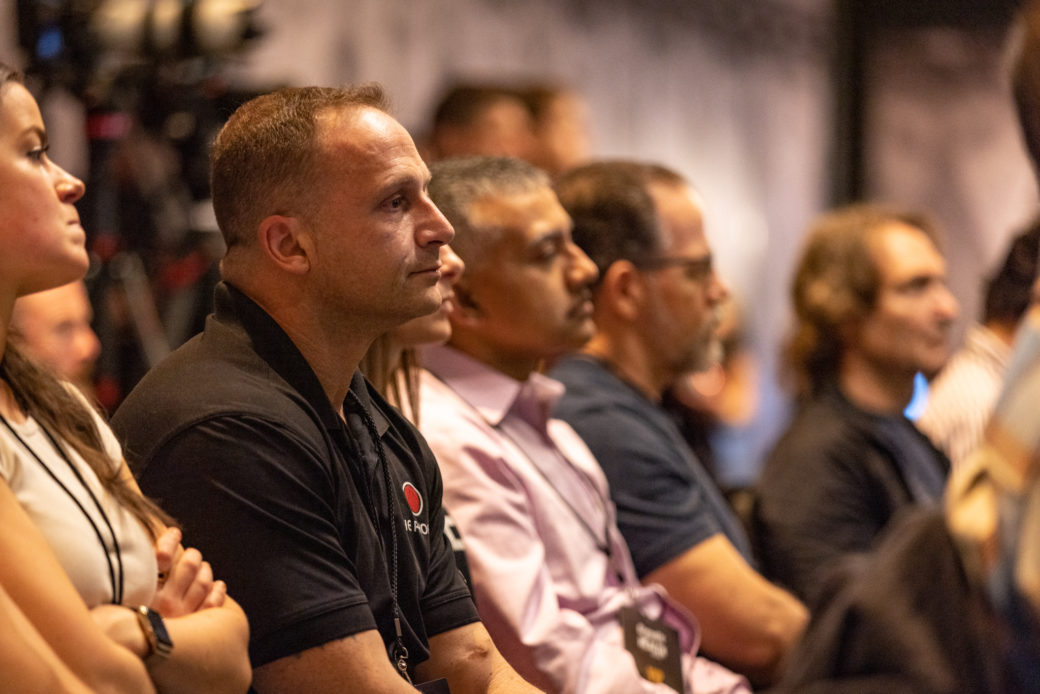In February 2024, CrossFit affiliate owners, coaches, and healthcare professionals came together for the CrossFit for Health Summit, presented by GORUCK. CrossFit thought leaders led panel discussions on fitness, performance, and the hard work of health, while renowned experts shared cutting-edge research on longevity, chronic disease, mental health, and community — and CrossFit’s powerful role in it all.
On May 24, 2018, Christopher Spallina woke up on the ground next to his car in Hazlet, New Jersey, surrounded by the police officers who’d resuscitated him. He’d survived a near-fatal overdose of fentanyl, a synthetic opioid 100 times stronger than morphine and 50 times more potent than heroin. Just 2 milligrams can kill a person.
Spallina had thought what he’d taken was heroin, and he could handle 15-20 bags (about 2 grams) a day of that. So he consumed two bags in his parked, but running, car.
When Spallina awoke, an officer pointed to some children playing basketball about 100 feet away.
“You see those kids over there?” the officer said. “You could have killed those kids, and you would have went back to prison for the rest of your life.”
Spallina, then 35, had already served more than six months behind bars for possession of narcotics with intent to distribute. Going back would be bad; killing someone would be unfathomable.
“I didn’t really care too much about my own well-being at the time,” Spallina said, “but I knew I didn’t want to hurt anybody else.”
There was no singular trauma or temptation that triggered Spallina’s addiction.
“It was the late ‘90s,” he said by way of explanation.
Prescription opioids were everywhere and easy to get. Spallina and his friends — teenagers — were just experimenting.
“If it’s something that the doctor can give you, it can’t be that bad,” he thought at the time.
By his early 20s, Spallina was physically dependent on opioids. He spent the next 15 years trying to get sober.
“I’ve been to treatment and detox nine times,” he said.
Occasionally, he managed to rack up short periods of sobriety.
“But … there was always something missing,” he said. “Feelings of guilt, shame, and embarrassment would come up, and I didn’t really know how to cope with them. And I would end up using just to not feel those emotions, and then just compound the problem over and over.”
After Spallina’s stint in prison in 2013 — during which he experienced six months of shock incarceration, described as a “quasimilitary program involving physical training, drill, manual labor, and strict discipline” — he managed a drug-free year.
“The physical fitness piece (of shock incarceration) really resonated with me,” Spallina said.
So he started CrossFit, staying “sober just by fitness.”
But then he got off parole. He ran 5K races and indulged in the free beer after. One thing led to another, which led to “full-blown addiction” once more.
And he stopped going to CrossFit.
“I was embarrassed,” he said. “I didn’t want to walk in, high, to my gym people that would hold me accountable.”

Chris Spallina at the 2024 CrossFit for Health Summit I Photo by Tyson Oldroyd
Spallina’s 2018 near-fatal overdose was his fifth of the previous three years. The cops took him straight to jail, where a judge ordered he stay unless he could find a treatment center that would take him.
“And while I was in that treatment center, somebody came in from The Phoenix and asked me what I was going to do when I left,” Spallina recalled.
He didn’t have an answer.
“Why don’t you come check this out?” the woman said. “We’re doing CrossFit and yoga and all these things, and it’s free. All you have to do is be sober for 48 hours.”
After treatment, Spallina went to his first Phoenix experience.
“And I never left,” he said.
The Phoenix is a nationwide nonprofit organization that helps people “rise from the impacts of addiction and harness the transformational power of connection.”
The organization partners with gyms, community and enrichment centers, specialists, and more to facilitate human connection through free activities ranging from creative writing to rock climbing to guided meditation.
One of those activities is CrossFit.
“Right now, we have over 135 affiliates that have opened their doors to us to lead free community classes for our members,” said Spallina, now a senior regional manager for The Phoenix overseeing staff, volunteers, partnerships, and programming in the mid-Atlantic region.
In February, Spallina joined an audience of healthcare professionals and CrossFit affiliate owners and coaches at the CrossFit for Health Summit in Austin, Texas. The one-day event featured panel discussions and talks given by experts and thought leaders on longevity, mental and metabolic health, and chronic disease.
Among the presenters were representatives from The Phoenix, who spoke about the epidemics of mental illness, addiction, and loneliness plaguing the United States: 48 million Americans struggling with alcohol and drugs, of whom less than 6.5% are able to access care. Forty-two billion dollars spent annually on rehabilitation. A death every 2.3 minutes.
CrossFit, said The Phoenix’s Dr. Katie Heinrich, can help.
“There’s incredible synergy between the unique CrossFit culture that values hard work, accountability, courage, and service to others and our sober active approach at The Phoenix that makes us natural partners,” she said during the presentation.
The Phoenix’s Dr. Jacki Hilios agreed.
“CrossFit isn’t just a workout,” she said. “CrossFit, like The Phoenix, is building communities. It’s helping people heal together. We can empower a more connected and healthy society together.”
That’s a tall order for an exercise program.
But in CrossFit, exercise is just the input. The output is far more than the sum of its parts.
“Realizing they can do hard things or do something they didn’t think they were able to, with the support of the other members of the community, that’s what keeps people coming back,” Spallina said. “Because they want to feel that connection; they want to feel that high-five; they want to feel like they accomplished something they didn’t think they could.”
And Spallina would know. Come May 2024, he’ll be six years sober.
“It was physical fitness with the supportive community that I found with CrossFit and The Phoenix that really brought everything together,” he said. “That, for me, was the missing piece of the puzzle.”
About the Author
Brittney Saline is Senior Writer and Editor for CrossFit, LLC. Previously, she was a writer and editor for the CrossFit Journal. She’s been sharing powerful stories from and for the CrossFit community since 2012, covering topics ranging from problems with healthcare and Big Pharma to CrossFit’s potential for reversing symptoms of Parkinson’s disease to discourses on femininity and musculature. She lives in Minneapolis, Minnesota, with her pug, Leo. Got a story to share? Email Brittney here.

Chronicles From the CrossFit for Health Summit: From Opioid Overdose To Clean With Community